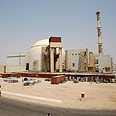
Iranian FM: Tehran ready to resume nuclear talks
Ali Akbar Salehi says Russian proposal will aid negotiations of its nuclear program with global powers; Russian FM Lavrov says Iran's Bushehr nuclear plant to be operational very soon
Iran is ready to resume negotiations on its nuclear program and a Russian proposal will aid the process, Iran's foreign minister said Wednesday.
Ali Akbar Salehi spoke at a news conference in Moscow with his Russian counterpart Sergei Lavrov, but neither side gave new details about the Russian proposal.
- Receive Ynetnews updates directly to your desktop
Six nations – the US, Russia, Britain, France, China and Germany – have been pushing Iran to meet UN Security Council demands to stop enriching uranium amid fears Iran aims to develop nuclear weapons. The last round of the "sextet" talks was in January.
The Russian proposal is for a "step-by-step" approach under which the international community would make limited concessions to Iran for each step it makes in disclosing its nuclear intentions. The United States has worked with Russia on the plan, which Russian Security Council head Nuikolai Patrushev discussed in Iran this week with Tehran's top nuclear negotiator.
"I agree that talks should be begun on the Iranian nuclear question," Salehi said, adding "(But) we will not accept any kind of pressure."
On the Russian proposal, "we consider that there are good elements in this proposal. It puts obligations on all sides," Salehi said.
Lavrov declined to speculate on when new steps might be taken under the plan.
'Bushehr plant to open very soon'
 |
Lavrov said during Wednesday's conference that the Bushehr nuclear plant, which Russia had agreed to construct in the 1990s, would start operating very soon and that the date was being agreed upon with Iran.
A senior Russian diplomat said earlier this year the plant was likely to become fully operational by early August.
The Bushehr plant in Iran is not a weapons-proliferation concern because of international safeguards on its spent fuel. But Iran has celebrated the plant as a major technological achievement and a sign of its determination to master all aspects of nuclear technology.
However, the plant's entry into service has been repeatedly delayed.
Tehran denies accusations that it is trying to develop nuclear weapons, insisting its nuclear program is aimed at generating electricity and producing isotopes to treat medical patients.
But Western concerns have grown, because Iran's uranium enrichment program could also make fissile warhead material and it refuses to cooperate with UN investigations of possible military dimensions of its nuclear programs.
The Associated Press and Reuters contributed to the report
- Follow Ynetnews on Facebook










